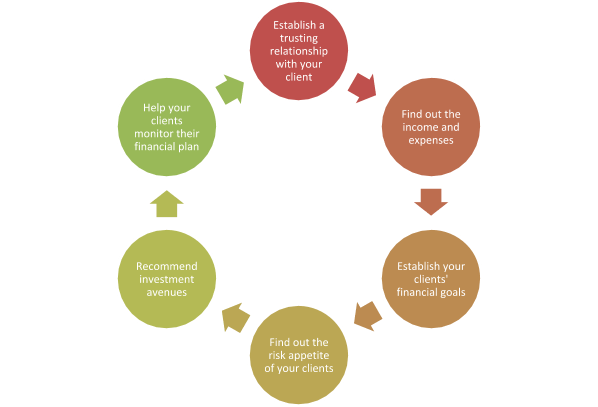
Living a financially secured life is the dream of every individual. As such, individuals earn, save and invest to try to create sufficient funds for their needs and financial goals. A financially secured life is, however, possible when individuals have a well-defined financial plan at their disposal.
Financial planning is the key to unlock financial freedom. It is a process of managing money in such a way that it not only helps your clients meet their daily living expenses, it also allows them to plan for their financial goals. The financial planning process consists of the following steps –

Your clients should, therefore, do the following to make a sound financial plan –
- They should identify their financial goals, the time horizon of each goal and also the amount of money needed to fulfil each goal
- Once the goals are identified, they should assess their income and expenses and make a budget.
- When a budget is made, they can find out their disposable income which can be saved for meeting financial goals. This would constitute their savings which they should invest in suitable investment avenues for fulfilment of their goals
- While investing, tax planning is essential to minimize their tax liability and maximize their returns
- Once your clients create a financial plan, the plan should be reviewed at regular intervals to ensure that it is relevant to their changing financial needs
Why financial planning is necessary?
There are various reasons which highlight the importance of financial planning. Here are some of them –
- Financial planning would allow your clients to manage their money effectively. They can plan their expenses and investments so that they have sufficient funds to meet their needs
- If financial planning is done properly, your clients’ tax liability can be reduced giving them a higher disposable income to save for future
- Financial planning helps your clients choose a suitable investment avenue for wealth maximization
Key tips for an effective financial plan
Before you encourage your clients to start financial planning, here are some key aspects which should be explained –
- Inflation
- The early bird effect
- Risk profiling
- Creating an emergency fund
Inflation means the general increase in the price of goods and services. Inflation is a real and important factor which reduces the value of money over time. Thus, when your clients plan to save for future, they should consider the effect of inflation on their savings. The corpus which is sufficient today would not be sufficient a decade or two later. Your clients should, therefore, plan their investments in such a way that the corpus created in future would be sufficient to fulfil their needs.
When it comes to investments, the earlier your clients start the better. Investments earn compound returns and if they are given a long-term horizon, they multiply considerably creating a substantial corpus. So, motivate your clients to start investing ASAP to get the maximum returns from their investments.
When choosing investment avenues, the risk profile of your clients should be kept in mind. There are different investment instruments available in the market and each instrument has a different risk profile. Your clients should choose instrument(s) based on their risk-appetite.
In any financial plan, an emergency fund is very important. Your clients should have at least 6 months’ income in a fund which can be used for emergency situations. Once the emergency fund is created, other investment avenues should be explored.
Your role in your clients’ financial planning
Financial planning is an art and your clients might need your expert help and opinion when they want to make a financial plan for themselves. If your clients are unaware about the meaning and importance of financial planning, you should educate them why financial planning is needed and how they can go about it. You can, therefore, help your clients with financial planning. Your role in their financial planning process should be as follows –

A sound financial plan can give your clients the solution to handle their finances effectively and achieve financial independence. They can also choose the suitable investment avenues based on their risk appetite and financial goals. You, as a certified financial advisor, can help your clients with their financial planning process. This would also help in building trust and your clients would seek your help for their insurance and investment needs. So, help your clients and you would be rewarded with an increase in your business as your clients would trust you with their financial matters.








